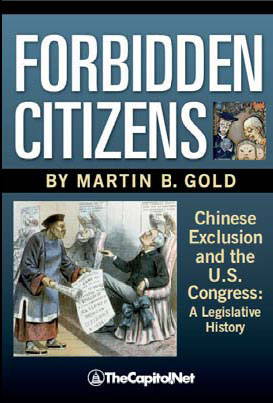Act of honor
Updated: 2012-07-20 07:59
By Tan Yingzi (China Daily)
|
||||||||
At the same time, Gold, who has written two books on Senate procedure, felt the urge to investigate the drafting of the exclusion laws.
"The distress Congress caused for multiple generations of Chinese - those who were directly affected as well as their families - is still real," he wrote in his latest work. "Shedding light on the past helps to ensure that such miscarriages do not recur."
Using senators' and representatives' own words, the book chronicles the sad and disturbing legislative history of the Chinese exclusion laws, with many passages transcribed from the debates, he says.
Though Congress expressed regret for passing the laws, the exclusion story remains unfamiliar to most Americans, including those of Chinese heritage, Gold says. He hopes his book, published on July 4, will help redress this.
Since first visiting China in 1998, Gold has developed a warm feeling toward its people and become committed to promoting exchanges between the country and the US.

He has been a guest lecturer at Beijing's Tsinghua University and the Foreign Studies University.
In 2006 President George W. Bush appointed Gold to the United States Commission for the Preservation of America's Heritage Abroad, a position through which he encountered the story of Jews in Shanghai. He led an effort in 2008 for official US recognition of Ho Feng Shan, a Chinese diplomat who rescued Austrian Jews from Nazi persecution during World War II.
To promote understanding of China, Gold has taken several delegations of former members of Congress to the Shanghai Jewish Refugees Museum and told them the story of Ho's humanitarianism.
Gold says the US historically has a European-centered view of the rest of the world and that, partly as a result, most Americans know little about China. But he believes this will change as the US-China relationship continues to develop.
Current lawmakers in Washington who are around Gold's age of 65 grew up with the Cold War and had little contact with China, he says, so it is natural that many hold stereotypes about the country.
But much has been done, on various levels, to remedy this, he says.
"We need to know the difference between Ming and Qing (dynasties); we need to understand what motivates Chinese people, what Confucianism means to them.
"We do not need to agree on everything, but we should understand each other."
Contact the writer at tanyingzi@chinadailyusa.com

 Relief reaches isolated village
Relief reaches isolated village
 Rainfall poses new threats to quake-hit region
Rainfall poses new threats to quake-hit region
 Funerals begin for Boston bombing victims
Funerals begin for Boston bombing victims
 Quake takeaway from China's Air Force
Quake takeaway from China's Air Force
 Obama celebrates young inventors at science fair
Obama celebrates young inventors at science fair
 Earth Day marked around the world
Earth Day marked around the world
 Volunteer team helping students find sense of normalcy
Volunteer team helping students find sense of normalcy
 Ethnic groups quick to join rescue efforts
Ethnic groups quick to join rescue efforts
Most Viewed
Editor's Picks

|

|

|

|

|

|
Today's Top News
Chinese fleet drives out Japan's boats from Diaoyu
Health new priority for quake zone
Inspired by Guan, more Chinese pick up golf
Russia criticizes US reports on human rights
China, ROK criticize visits to shrine
Sino-US shared interests emphasized
China 'aims to share its dream with world'
Chinese president appoints 5 new ambassadors
US Weekly

|

|






